Here are some pages from Dallas FBI Agent James Hosty's book, "Assignment Oswald".
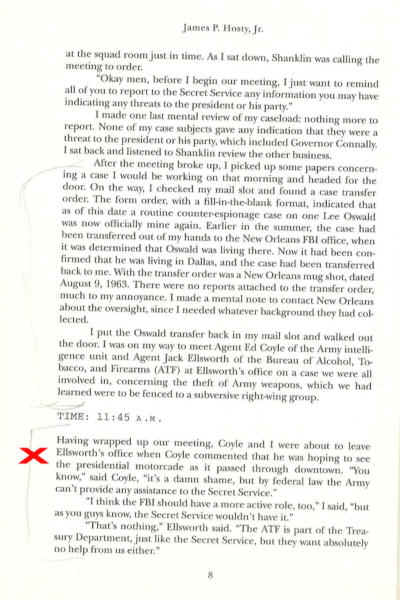
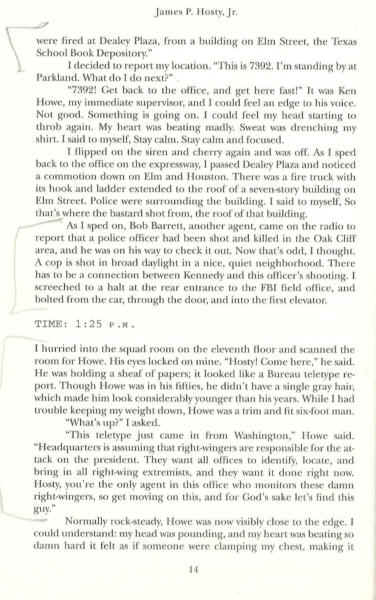
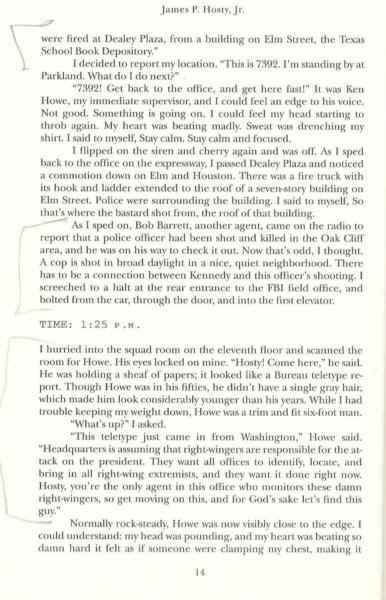
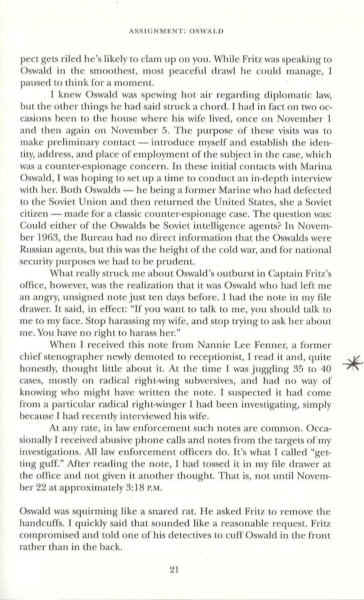
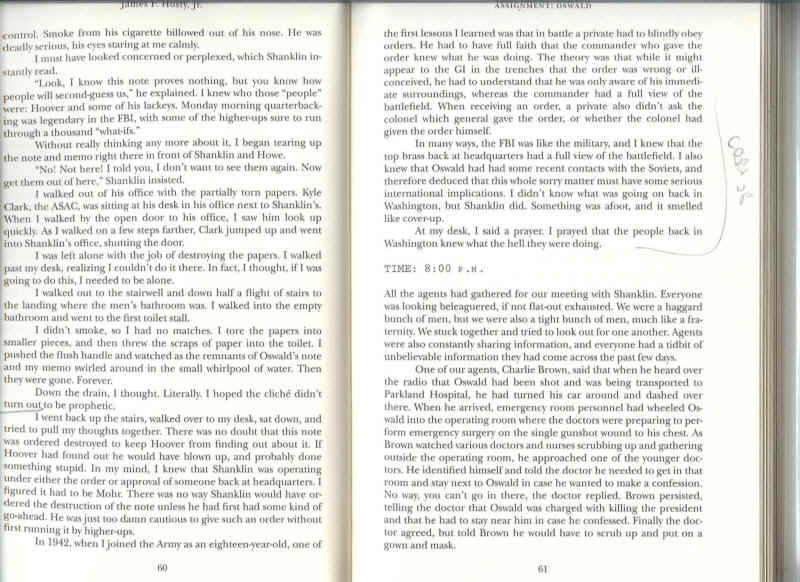

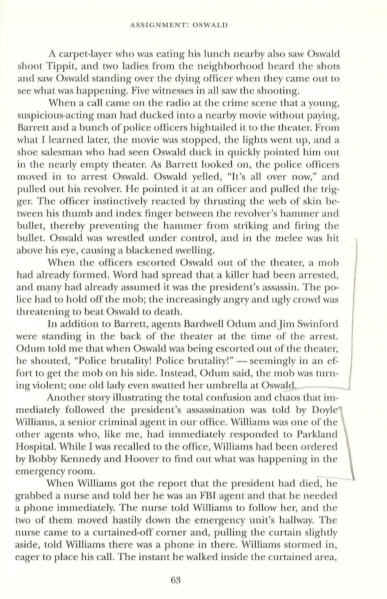
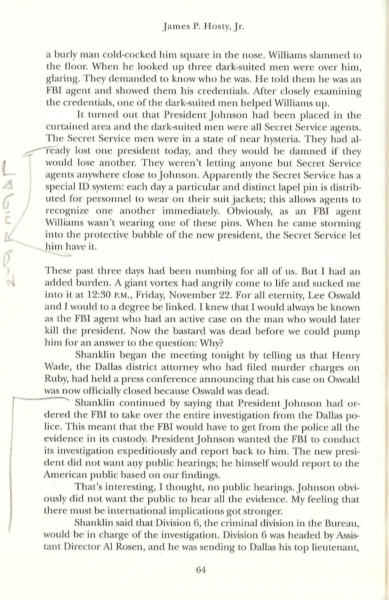
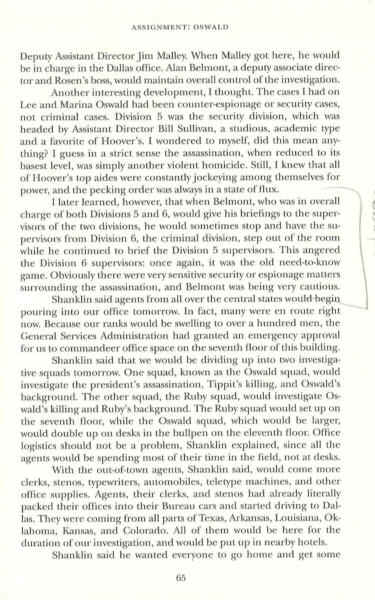
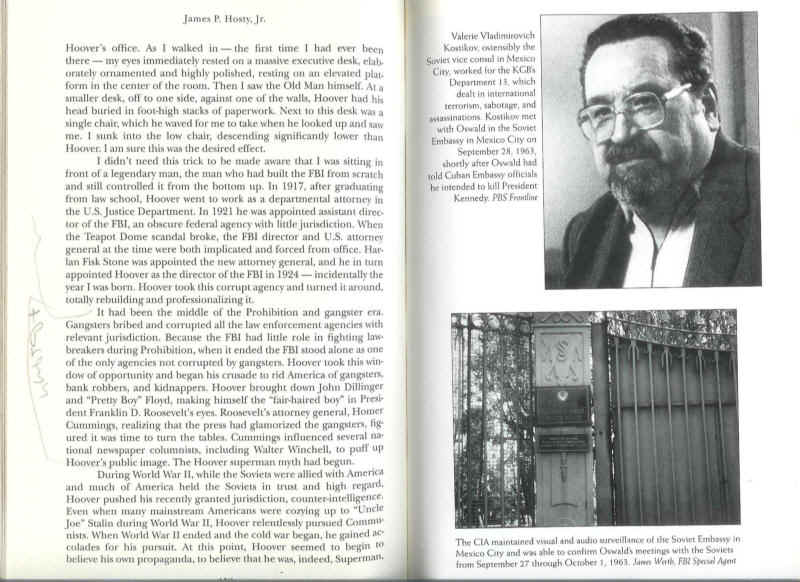
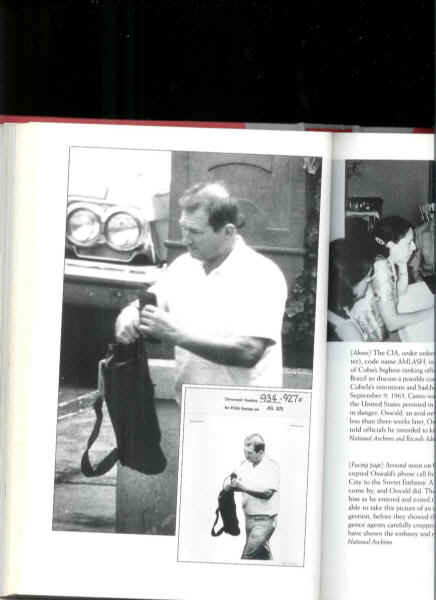
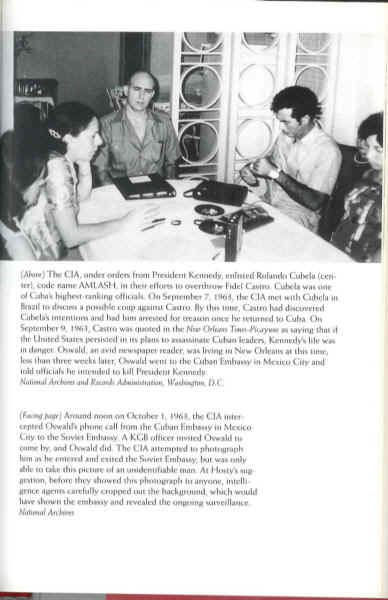
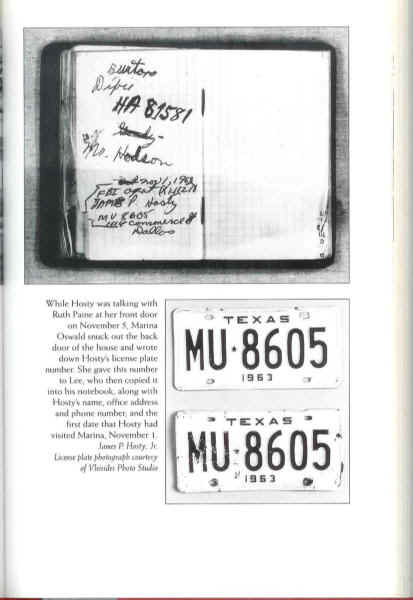
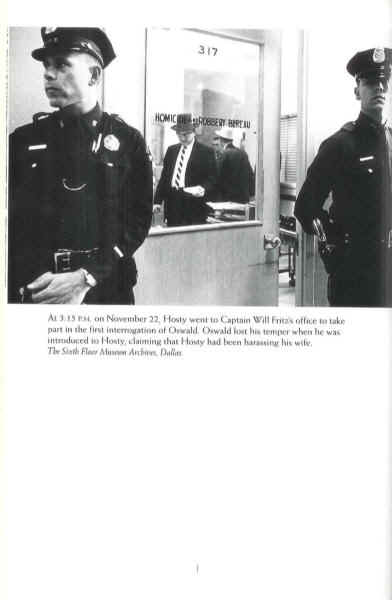
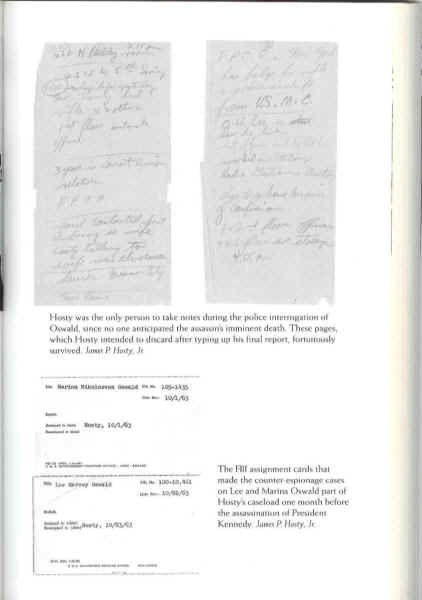
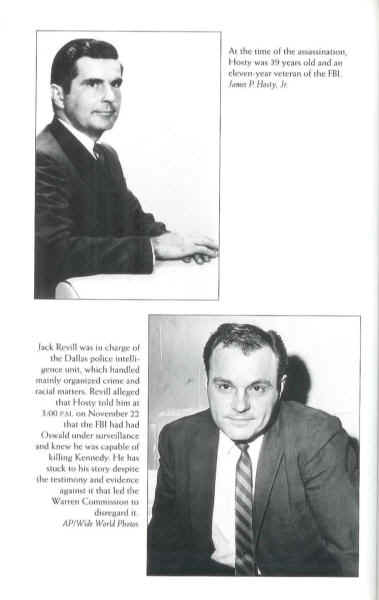
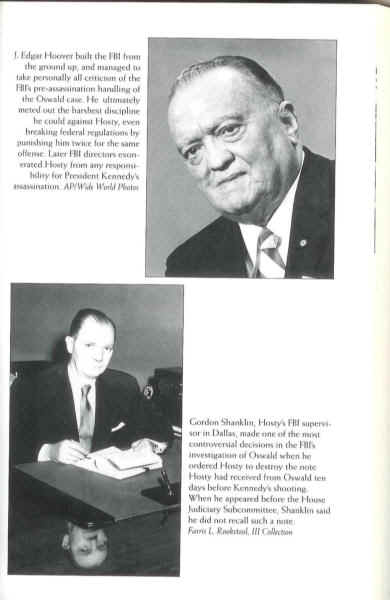
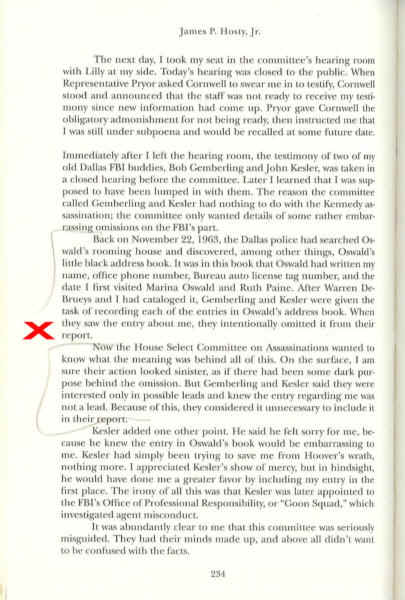
HERE are different accounts of the Oswald note
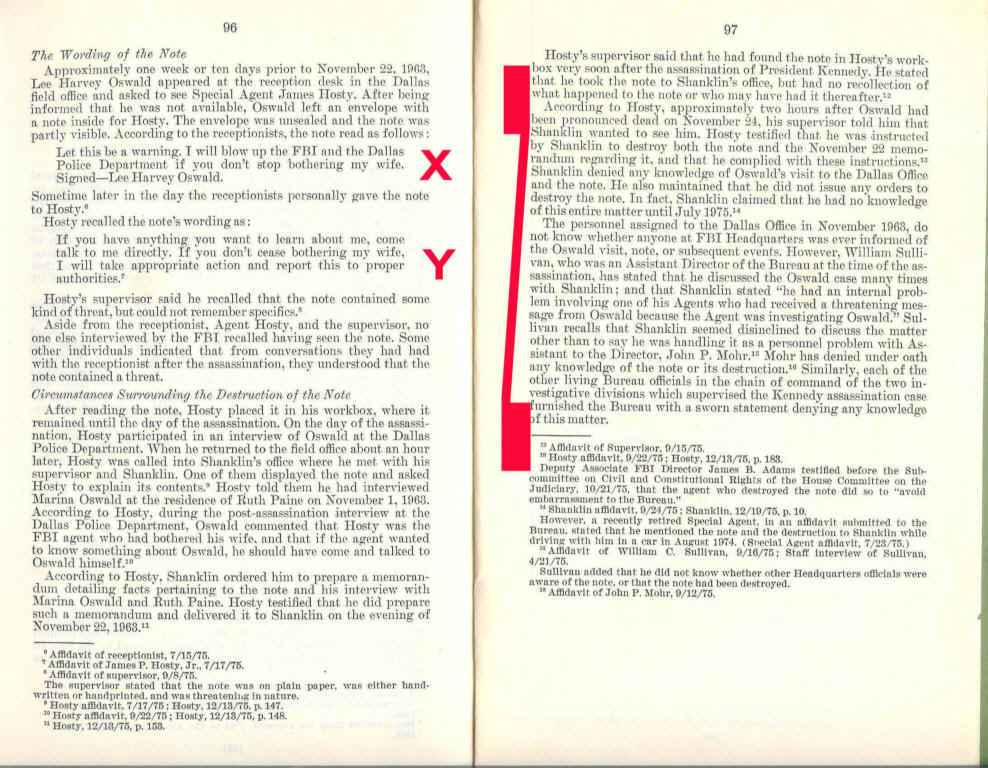
OSWALD WAS HOSTY'S INFORMANT
Gayton, Carver
Clark
(b.1938)
HistoryLink.org
Essay 4305 : Printer-Friendly
Format
Carver
Clark Gayton is a leader in education reform and workforce training. He
graduated from
Proud
Heritage
Carver
is the sixth child of John Jacob Gayton (1899-1969) and Virginia Clark Gayton
(1902-1993). His father was the first child of
Carver’s
mother, Virginia Clark Gayton, was the grand daughter of the famous black
abolitionist Lewis Clarke (1815-1897), whose experiences as a slave were
reflected in the publication Narratives of the Sufferings of Lewis and Milton
[Lewis’s brother] Clarke: Sons of a Soldier of the Revolution. The book
was first published in 1845, the same year as Fredrick Douglass’s narrative.
Clarke was interviewed repeatedly by Harriet Beecher Stowe in her own home, with
his descriptions of slave atrocities he suffered and witnessed providing a
foundation for Stowe’s book Uncle Tom’s Cabin. Virginia Clark Gayton
was a leader in her own right and was recognized nationally in 1984 by the
Schlesinger Library of Radcliffe College, as one of 72 “Black Women of
Courage” for her outstanding professional and voluntary activities.
Carver’s
parents raised eight children and by example, modeled for them a strong work
ethic, the importance of education and commitment to community service. Both
parents worked for the
The
Early Years
Carver
was born and raised in the Madrona District of
As
grade school kids they played cops and robbers and mumbly peg but as they
approached adolescence they became more contemplative and talked about
“serious” issues such as girls or the likelihood of an afterlife. Most of
the boys had paper routes and ended up spending their earnings at the
neighborhood soda fountain and drug store on the corner of 34th and
Carver
went to
The
legendary Darrell Royal, Head Football Coach at the University of Washington in
1956, offered Carver a four-year football scholarship to the university with the
admonition, “Although you’re small, if you continue to show the desire and
perseverance you displayed while playing ball at Garfield you will have no
difficulty retaining your scholarship.” Carver went on to earn three varsity
letters in football, averaging five yards per carry rushing over three years. He
was a starter at the beginning of the 1959 season, but tore the ligaments and
cartilage in his knee in the second game. He was declared lost for the year but
built up his knee enough by the end of the season to play in the historic 1960
Rose Bowl when the Huskies drubbed Wisconsin 44 to 7. Carver, George Fleming Joe
Jones, and Ray Jackson “…represented the largest total of first-line Negro
backs ever to perform in the historic ‘daddy’ of all the annual bowl games
…” up to that time. Carver and his teammates were inducted in Husky Hall of
Fame in 1994, the first Husky football team to be so honored, and regarded by
many as the best football team to ever play for the University. The team
continues to have reunions every few years. Carver was also honored by being
recognized as a “Husky Football Legend” on November 8, 1997, at Husky
Stadium during halftime ceremonies. Carver also earned a varsity letter in track
at the University of
Beginning
a Career
After
graduation, Carver was hired by Husky football coach Jim Owens in the fall of
1960 as a graduate assistant coach while he worked on his teaching credentials.
In that role he was proud of the fact that he contributed to the team winning
its second consecutive Rose Bowl victory with a victory over the University of
Minnesota on New Years Day 1961.
In
September of that year, Carver was hired by his alma mater,
During
the administration of President John Kennedy, the President's brother Robert,
the U.S. Attorney General, encouraged blacks to become Federal Bureau of
Investigation agents. After a casual conversation with his brother Gary about
becoming an agent, Carver applied and to his surprise was accepted. The letter
formalizing his appointment was signed by the F.B.I. Director J. Edgar Hoover
and dated November 14, 1963. He received the letter a few days before the
assassination of the President. Carver became the first black F. B. I. agent
from the state of Washington, one of only a dozen or so in the U. S., and the
only black agent assigned to the states of Kansas, Missouri, and Pennsylvania
during his four years in the Bureau.
Carver
was assigned to the Philadelphia Office for three years and handled primarily
bank robbery and fugitive cases. From time to time he would conduct background
checks for Presidential appointments, investigations of the “La Costa
Nostra” as well as security matters. Carver received numerous commendations
for his service, several of which were from the controversial J. Edgar Hoover.
Carver’s first-hand observations of poverty and lack of education among people
of color in the ghettoes of the cities in the East convinced him to return to
the field of education. He continued graduate studies at night while in
Philadelphia, and was close to completing his Master's Degree in Education
Administration at Temple University when he was recruited away from the F.B. I.,
in November 1997.
The
director of Special Security Programs at Lockheed Missiles and Space Company, in
Carver
and his family had been living in Mountain View, California, for only a few
months when he was contacted by the Assistant Athletic Director at the
University of Washington, Joe Kearney, who called on behalf of Jim Owens, the
Head Football Coach and Athletic Director and representatives of the U. of W.
Black Alumni Association. He was told that Jim Owens was under attack from
former and current black athletes for his policies and practices and wanted him
to accept the position of assistant coach of the football team.
After
much soul searching, deliberation, and negotiation, in the summer of 1968 Carver
decided to accept the job offer by the University and was hired by the Athletic
Department as assistant football and track coach and counselor. He also had an
assignment as Assistant to the Vice President for University Relations, Robert
Waldo. Carver became the first full-time black coach in the history of the
The
positive turn around regarding race relations for the football program was
short-lived. A threatened boycott by some of the black athletes in October 1969
led Coach Owens to suspend four black players. In support of the black athletes,
and in protest of the suspensions, Carver resigned. As a result of his stand,
Carver and his family received mail and phone threats of harm from across the
nation.
In
December 1969, Dr. John Hogness, Executive Vice President of the University,
appointed Carver to the new position of Director of Affirmative Programs,
reporting directly to Dr. Hogness’s office. His responsibility was to
establish policies and programs to increase the numbers of minority faculty and
staff at the university. He established the first affirmative program by an
institution of higher education in the state. Additionally he initiated the
first comprehensive staff training program for the university.
During
the seven years he served in this position he continued to take graduate
courses, completing his Masters of Public Administration in 1972 and his Ph.D.
in Political Science in 1976. The title of his dissertation is “Federal
Funding and Its Impact on the University.” His major areas of emphasis
included political theory, organizational theory, higher education policy and
public administration policy. Carver’s primary mentor while working on his
dissertation was Professor Dael Wolfle, an internationally recognized scholar in
higher education and workforce policy and the former managing editor of Science
magazine. While working on his doctorate Carver taught courses in political
theory and the politics of black Americans as a teaching assistant in the
Political Science Department.
A
Move South and Back Home Again
In
1977, Carver became a full-time assistant professor in the Department of Public
Administration at
In
August of 1979 he had airline reservations to fly to the city of Dubrovnik,
Yugoslavia (former) to do three years research of their public personnel system,
when he got a call from a former colleague with whom he had served as Directors
on the Seattle School Board. Phil Swain was Corporate Director of Education and
Training for The Boeing Company and invited Carver to work in his office and
represent Boeing in setting up a new engineering college in the Seattle area
under the sponsorship of the company. The excitement and challenge of working
and living in Yugoslavia was enticing for Carver; however, his desire to be back
home in Seattle with his family and the challenge of working in the field of
education with a large and influential corporation won out over the Balkans. He
cancelled his
The
Boeing Years
During
Carver’s first three years at Boeing as Corporate Manager of Education
Relations, he was the lead executive in overseeing a contract between Boeing and
While
at Boeing, Carver received considerable local, national, and international
recognition for educational programs and activities he initiated and led. He
received the National Association of Partnerships in Education’s McKee award
for the innovative business/education partnerships he developed for the
corporation. The Boeing Company received many awards for the programs he
developed such as the National Service Award from the Employment Management
Association (composed exclusively of Fortune 500 companies) for the most
innovative human resource program in the nation and from the National Alliance
for Business for developing the “best school to work program in the United
States.”
He
was a keynote speaker and presented papers for national conferences on education
reform throughout the
A
New Challenge: State Government
Carver
had been very pleased with his accomplishments and the exciting challenges
before him at The Boeing Company; however, in December 1996 Governor Elect Gary
Locke telephoned Carver and asked him if he would join his Executive Cabinet as
the Commissioner of the Washington State Department of Employment Security.
Carver was extremely flattered by the Governor’s request, but advised him that
he needed to take time to think it over. Carver’s first reaction was to turn
down the offer, but after considerable discussion with his wife, Boeing
colleagues, and close friends he decided to take the position. The challenge of
managing an agency of 2,500 employees and a half a billion dollar budget got his
competitive juices flowing. Carver called the Governor a week later to accept
the appointment.
Carver
assumed his duties as Commissioner in March 1997. During his years as
Commissioner, he led the greatest changes in the agency’s 65 year history. In
one year alone over 1,000 employees had their jobs revised to meet the
technological requirements needed for improvement of customer services.
Concurrently, services for customers regarding unemployment benefit programs
went from 38 sites throughout the State to three telephonic centers. While all
these changes took place, agency employees not only met but exceeded the vast
majority of the goals and targets that had been set for the Department. As a
result of these accomplishments the agency received dozens of quality
improvement awards from the Governor’s Office and a score of recognitions from
the
Carver
retired from the Governors Office in 2001, fulfilling his commitment to the
Governor when he was first appointed, that he would stay with the agency from
two to four years. Additionally, he was satisfied that he had accomplished the
goals and objectives he had set out to meet.
Carver
is currently a lecturer at the
Voluntary
Service
Growing
up in
Appointments
by five Washington State Governors; Governor Evans, Washington State Youth
Commission; Governor Spellman, Washington State Committee on Education, Policy,
Structure and Management; Governor Lowery, Governor’s Council on
School-To-Work; Governor Gardner, Seattle Community College Board of Trustees
(Re-appointed by Governor Locke) on which he served as President for two terms.
Carver also served on many national boards including appointment by the U. S.
Department of Education National Advisory Panel/National Center for Post
Secondary Governance and Finance and as a board member of The Association of
Governing Boards.
Carver
was appointed to the Seattle School Board as a Director in early 1973 to fill
the uncompleted term of the first African American to hold that position, Alfred
Cowles. He ran unopposed for election in November 1973 and served until the end
of 1975 to pursue his doctorate degree. He was especially proud of two
accomplishments while on the board: (1) authoring the Board’s first
affirmative action policy for faculty and staff, and (2) leading the board
toward restructuring Garfield High School as an “exemplary” magnet school
with emphases in science and math. Garfield was threatened with closure by the
Washington State Superintendent’s Office for failure to meet state
desegregation guidelines, because of its nearly 90 percent black enrollment.
Carver
was a founding board member of City Club, and Leadership Tomorrow, where he
served as vice president. Other board involvement includes Trustee, KCTS,
Channel 9 Association Board;
Carver
continues to serve on many committee’s and boards in the Seattle community
including: Co-Chair, African American Museum Campaign, Seattle Urban League;
Vice President, Haas Foundation; Board of Trustees and as one of two chairs for
the Seattle Public Schools Committee for Fiscal Integrity, which is continuing
its review of the financial crisis that hit the School District in 2003.
Local
and Regional Honors and Recognitions
Carver’s
many local and regional recognitions include induction into the Fredrick
Douglass Distinguished Scholars Honor Society (1988), and recipient of the
Blacks in Government (Region 10) Outstanding Citizen Award (1989). He was named
a “University of
In
1997 Carver became the first African American alumnus of the
Immediate
Family
Carver
has three children from a previous marriage to Mona Lombard: Cynthia Marie
Gayton, Esq.; Carver Clark Gayton Jr., and Captain Craig Michael Gayton, D.D.S.
Cynthia is a successful attorney in the Washington D.C. area and an adjunct
professor in the Graduate School of Engineering at George Washington University.
Clark (Carver Jr.) lives in
Carver
is married to Carmen Walker Gayton, a native of Anderson,
Sources:
Georg N. Myers, “The Sporting Thing: Farewell to Football,” The Seattle
Times, October 21, 1959; Rose Bowl official Program: Washington vs
Wisconsin, January 1, 1960, Pasadena, California; “Gayton Good Choice,” Seattle
Post-Intelligencer, July 8, 1968; Lewis Clarke, Narratives of the
Sufferings of Lewis and Milton Clarke: Sons of a Soldier of the Revolution,(New
York: Arno Press, New York Times, 1969); Gordy Holt, “Gayton Brothers:
Troublemakers or What?” Seattle Post- Intelligencer, April 26, 1970;
“12 Women, 2 Men Nominated for Seattle Women’s Commission,” The
Seattle Times, March 27, 1971; Constantine Angelos, “Gayton Concerned
About Entire City,” Ibid., April 1, 1973; Paul Boyd, “Gayton is
Setting his Sights High,” Seattle Post-Intelligencer, April 1, 1973;
Audrey Edwards, “A Family Christmas: The Making of a Memory,” Redbook
Magazine, December 1973; “Gayton to Chair National Association of
Affirmative Action Officers Conference,” The Medium, July 25, 1974;
Walt Evans, “Hark! Tis a Time for Governor Dan,” The Seattle Times,
December 16, 1976; Doug Watton, “Minority ‘institution’ Moving to Sun
Country,” University of Washington Daily, April 5, 1977; Walt Evans,
“A Lot of Life: From Football to Varied Careers, Gayton has Filled Years
with Action,” The Seattle Times, May 19, 1980; Ronald W. Powell,
“Four Pioneering Black Women Honored,” Ibid., April 16, 1985;
Carver Gayton, “Business Can Help Themselves by Supporting Education,” Seattle
Business, December 1986; “U of W Awards Recognize Outstanding
Graduates,” The Seattle Times, November 22, 1987; Carrie Dolan,
“The Educator Executive,” Wall Street Journal, February 9, 1990;
Carver Gayton, “Responding to the Skills Gap: The Boeing Company and Tech
Prep,” E.C./U. S Conference, the Proceedings, Schools and Industry:
Partners for Quality Education, Nordwijk, The Netherlands, 25-26 June, 1992;
Carver Gayton, “Tech Prep: A Business Perspective, The Tech Prep Associate
Degree Challenge,” American Association of Community Colleges, Report
No. 6, 1994; Carver Gayton, “What’s in it for Business: Powerful
Partnerships for School to Career Success,” American Vocational Association,
1996; David Foster, “Seattle Pioneer’s Legacy: A Proud Confident
Family,” Los Angeles Times, February 4, 1996; “Boeing Corporate
Director to Address National Consultation on Worker Profiles for the 21st
Century,” The Gleaner (Kingston, Jamaica), May 4, 1996; “Minority
Execs Join Cabinet,” The Seattle Times, January 24, 1997; “Best of
1997: University of Washington honors Top Professors, TAs, Volunteers,” Columns
Magazine, June 1997; Susan Phinney, “Men of Influence,” Seattle
Post-Intelligencer, January 17, 1998.
Hosty was also
involved in the Walker shooting investigation.
Which might explain how the Steel Jacketed bullet recovered from the Walker shooting Morphed into a copper jacketed bullet for the Warren Commission.
SEE Volume XXIV page 38>>>
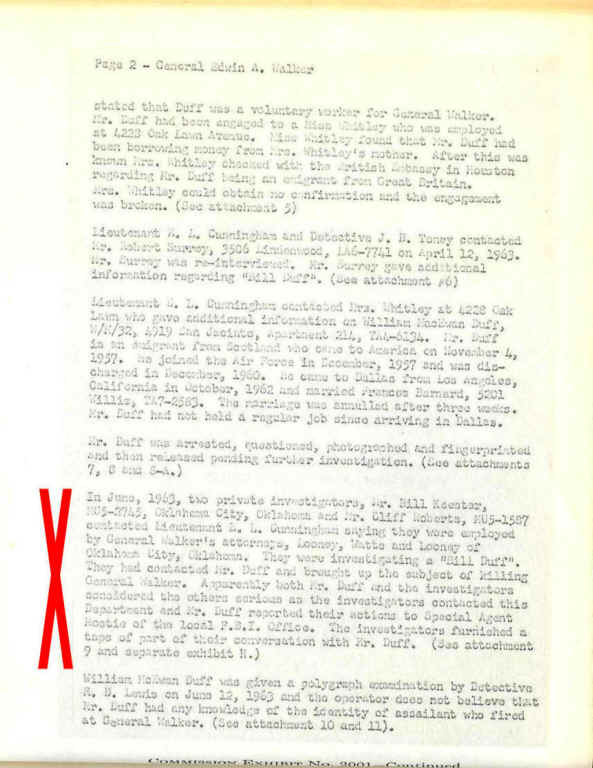
Page Visited
Times